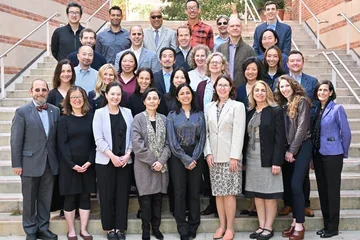What Is the Difference Between a Psychologist and a Psychiatrist?
A UCLA Doctor Explains

Wondering Which Specialty Best Suits Your Personality and Career Goals?
Undergraduate students who are interested in a career in mental health have a number of different options. Two of the most common fields are psychology and psychiatry. But what's the difference between a psychologist and a psychiatrist?

Education: PhD vs. MD
One of the main differences lies in the educational requirements. Psychologists go from their undergraduate studies to graduate school and continue on to doctoral level training. They do not complete medical school.
Within psychology, students can pursue a PhD or a PsyD. A PsyD has a stronger focus on clinical training, whereas a PhD puts more emphasis on research. All PhD programs and some PsyD programs require that students complete a dissertation. For either path, schooling and initial clinical training takes about five to seven years. An additional one to two years of clinical training is required after students finish their coursework.
(What Is a Psychologist? Click the link to learn more...)
In contrast, psychiatrists complete medical school after their undergraduate studies. After four years of medical school, psychiatrists move on to a four-year residency in general adult psychiatry. Toward the end of the residency, psychiatrists can choose to specialize further in areas such as child psychiatry, forensic psychiatry, geriatric psychiatry, addiction, psychosomatic medicine and more.
(What Is a Psychiatrist? Click the link to learn more...)

"One of the main differences is that psychologists are specifically trained in testing and performing structured interventions, as well as statistics and research methods," explains Margaret Stuber, MD, vice chair for education in the Department of Psychiatry and Biobehavioral Sciences at the David Geffen School of Medicine at UCLA "Psychiatrists have more training in understanding the physical body because they've been to medical school."
Daily Practice
Psychologists and psychiatrists are both licensed to practice by their individual state, not the federal government. Both professionals may also choose to focus on a specific area of expertise. A major difference, however, is that psychiatrists are able to prescribe medicine, and some patients see psychiatrists primarily to manage their medications.
Dr. Stuber also describes the differences between a psychologist vs. psychiatrist in terms of how a physician would refer a patient. She says that a psychologist is usually the first choice for a patient who needs psychotherapy or cognitive behavioral therapy, whether for short-term or long-term treatment. A psychiatrist may be the best referral for patients with more complex issues and who need medication.
While there are some significant differences between the two specialties, there is also a great deal of overlap. Psychologists and psychiatrists often collaborate closely and may see the same patients. For example, a psychologist might perform testing on a patient to assess what's happening in her brain. A psychiatrist may then prescribe any appropriate medications and manage the patient's medical situation, while the psychologist may follow up with regular psychotherapy. In this way, both specialists work together toward the same goal: improving their patients' mental health.
Choosing the Career Path That’s Right for You
Dr. Stuber specializes in child psychiatry and researches traumatic stress responses in children who have dealt with major medical issues, such as an organ transplant or cancer. She says that, originally, she was drawn to psychiatry because she was intrigued by the mind-body connection. Before migrating toward research, she had to complete further training to prepare her to bridge the clinical and academic worlds.
"In working with academicians and clinicians, I have seen two different ways of thinking," she says. "Physicians tend to have more interest in fixing problems and getting answers, whereas PhDs are interested in questions. When thinking about what you want to pursue, consider where your curiosity lies. If you are fascinated by biology and the body-brain connection, psychiatry might be your bag. If you are fascinated by human behavior, psychology might be a better fit."
(Psychologist vs Psychiatrist - Click the link to learn more...)



